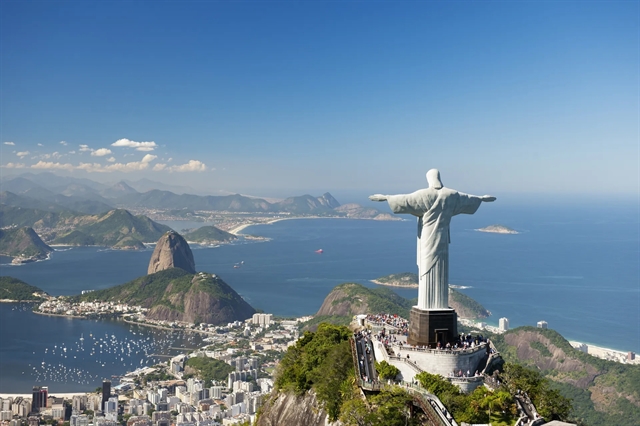Weather:
- Ha Noi 32oC
- Da Nang 28oC
- Ho Chi Minh 33oC
Brazilian ambassador Marco Farani wrote to Việt Nam News on Brazil's National Day (September 7)
It is with special joy that we celebrate today the National Day of Brazil.
With complementary economies, and with growing motivations, Brazil and Việt Nam have converging interests in different areas of undeniable importance, such as green agriculture, energy transition, digitalisation and innovation. Both are middle-income countries with large and young populations. Both value peace and stability, and both have an important role to play in international affairs.
The diplomatic relations of Brazil and Việt Nam date back to 1989, but only in 1994, the Brazilian government opened its diplomatic representation in this capital. However, historical accounts reveal that the link between Brazil and Việt Nam curiously dates back to 1912, when the young Hồ Chí Minh, future hero and national leader of Việt Nam, arrived in the city of Rio de Janeiro. A curious traveler and eager for knowledge, Hồ Chí Minh sought to understand the new reality around him, built friendships and became familiar with the culture of Brazil. During his stay in Rio de Janeiro, the young Hồ Chí Minh met the black union leader José Leandro da Silva, who participated in the "Revolta da Chibata", a rebellion of black sailors who protested against the unequal treatment imposed by their officers at that time. Nine years later, in 1921, inspired by that episode, Hồ Chí Minh wrote his famous text on racism and Human Rights, entitled International Solidarity.
Brazil and Việt Nam maintain a comprehensive bilateral cooperation, characterized by balanced relations and mutual respect. Recently, President Lula da Silva and Prime Minister Phạm Minh Chính met at the G7 meeting, held in Hiroshima last May. At this opportunity, President Lula invited the Prime Minister to visit Brazil. It is with great joy and enthusiasm that we are waiting for the Prime Minister's State visit on the last week of the current month. In exchange, the President of Việt Nam, Excellency Võ Văn Thưởng, also formulated an official invitation for our president to visit Việt Nam.

In the economic and commercial spheres, Brazil has been optimistic about the growth and economic dynamism of Việt Nam. Our trade balance is around US$7 billion, but there is enormous potential to be explored in the area of agriculture, green energy and defense. The presence of Brazilian exports in the countries of Southeast Asia is reflected in the growth of our trade with the region (jumping from $15.1 billion to $28.9 billion). In the first half of 2022 alone, Brazil's trade with ASEAN increased by 91 per cent to register $17 billion. In 2022, Brazil became a Partner of the ASEAN Sector Dialogue, counting on the valuable support of Viet Nam. I take this opportunity to reiterate our gratitude to the government of Việt Nam.
In the field of agriculture, Brazil has promoted, in the last decades, a true revolution to be today the world's largest exporter of products such as sugar, coffee, corn, orange juice, soy, beef and chicken meat, among others. It is important to highlight the commitment of Brazilian agriculture to sustainability through a huge range of public policies, in addition to having the strictest forest legislation in the world. It is also worth remembering that during the worst moments of the economic crisis caused by the pandemic, the country never failed to meet its food supply commitments, ensuring the food security of millions of people. With only 7 per cent of its territory occupied by agriculture, Brazil annually feeds about 800 million people worldwide, which corresponds to 10 per cent of the world's population.
With regard to the environment, it is worth mentioning that about 90 per cent of the Brazilian energy matrix today is renewable, a true inspiration and hope for the whole world, in which the energy transition is urgent in order to fulfill the commitments made of net zero emissions of CO2 by 2050. Thanks to the use of ethanol, which began to be developed in Brazil about fifty years ago when the first oil crisis occurred, Brazil currently has the largest and most complete decarbonization program in the world, 93 per cent of cars produced in Brazil are today powered by renewable and green fuel.

Another aspect of the current government's policy is the commitment to the preservation of the environment, especially the maintenance of forests, biodiversity and the restoration of affected ecosystems. Brazil has long stood out in multilateral forums as a pioneer in the fight against climate change. The tangible proof of this commitment, I am pleased to announce, was the reduction of 42 per cent of the level of deforestation in the country by 2023 in relation to the previous year.
In the international sphere, Brazil has just assumed the Pro-tempore presidency of Mercosur where it intends to work on deepening intra-bloc dialogue, aiming at the expansion of free trade among regional markets. Starting next year, Brazil will assume the Presidency of the G20, a unique opportunity to foster coordination among members in defense of a more just, sustainable and peaceful international community.
To conclude, I would like to express my commitment to work for the development of a constructive relationship between our two countries, especially in the areas that emerge as the most important, such as environmental sustainability, food security and maximum use of clean and safe energy, areas where Brazil has recognised expertise. VNS


